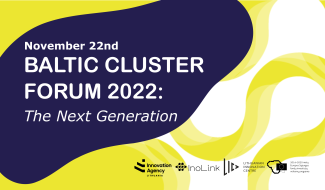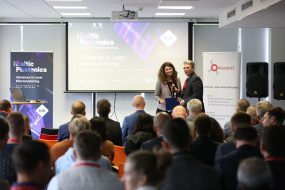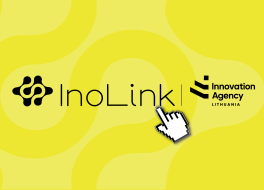Circular economy principles apply to both food technology and materials engineering

During the event “Applying circular economy principles to food technology and materials engineering” that took place on the 16 of June in Vilnius, science and business communities presented their activities, products developed in collaboration, shared market trends and discussed cooperation opportunities with potential partners from abroad.
The event was organized by the National Food Industry cluster (NaMŪK), the “Food Technologies Digitisation LT” cluster (FTD LT) and the Science, Innovation and Technology Agency (MITA).
“Even if you know what kind of scientific or business institution is operating in a country, unless you sit down at a round table to talk and share your experience, it remains just knowledge, but not action. Lithuanian companies were also interested in the scientific work and activities of our companies at this event. We also had guests from Lithuanian universities who were interested in CO2 extraction and the products being developed. We are very satisfied with the event, as it gave us a lot of ideas for new activities to strengthen the partnership”, – says Česlovas Bobinas, Director and Coordinator of the NaMŪK cluster
Aiming to reduce waste in the production process
During the event, scientists from the NaMŪK and FTD LT clusters presented products and activities that have already been born from business and science collaboration.
Separate presentations were given by the Lithuanian Centre of Agrarian and Forestry Sciences scientists Dr. Dalia Urbonavičienė and Dr. Lina Dėnė, researcher at the Latvian University of Agriculture, Dr. Vitalijs Radenkovs, Professor Radostina Alexandrova of the Bulgarian Academy of Sciences and Algimanta Ščiglinskienė, coordinator of the FTD LT cluster.
“Recently, there has been a growing awareness among consumers that food is not just about satisfying hunger, but about getting the best possible amount of bioactive compounds with their food. The problem is that most of the valuable compounds, such as carotenoids, polyphenols, etc., are not synthesized by the human body and must be obtained from food. Unfortunately, only 10% of bioavailable compounds are absorbed from food. Thus, scientists are tackling these problems and, together with businesses, scientists at LAMMC (Lithuanian Agrarian and Forestry Research Centre – editor’s note) have developed prototypes of functional foods, cosmetics and ingredients for pharmaceutical products,” said researcher D. Urbonavičienė.
To prevent the discarding of processing by-products (seeds, peelings, part of the pulp) from food production, scientists are constantly developing ideas on how to rationalize their use in the development of new, biologically valuable and innovative food products or food ingredients.
MB “Biofita” representative and NaMŪK cluster member Dr. Aistė Balčiūnaitienė gave a presentation on how to use plant by-products to create other materials.
To prevent waste from food production from being thrown away, scientists are continuously developing ideas on how to rationalize the use of waste to create new, biologically valuable foods or food ingredients. The green synthesis of metal nanoparticles produces high added-value functional materials with excellent applications in medicine, pharmaceuticals and the food industry, among other industrial fields.
“Synthetic synthesis currently uses aggressive chemical reagents that have a huge negative impact on our environment. In contrast, green synthesis of metal nanoparticles does not use any chemicals. We select the by-products of plant processing and employ them as reducing agents, which also act as stabilizers for the synthesis of metal nanoparticles,” says A. Balčiūnaitienė.
Concerning indicators for Lithuania
NaMŪK Cluster Director and Coordinator Č. Bobinas says that the event was prompted not only by the desire to open up new niches for science and business, but also by worrying statistics.
According to EUROSTAT mortality and life expectancy statistics, Lithuania is among the last countries in the European Union in terms of longevity. The average life expectancy is just over 74 years, compared to an average of 84 years in other EU countries.
The COVID-19 pandemic has further highlighted the importance of human immunity, and immunity is mainly influenced by good nutrition and quality food.
“The high consumption of saturated fats, trans fats and sugar in Lithuania is increasing the incidence of type 2 diabetes. Consumption of harmful foods has even been shown to affect genetic changes. This situation reduces the life expectancy of the country’s population, lowers the quality of life, and results in high health care costs for society as a whole. This situation therefore increases the economic burden on Lithuania”, says the Director of the NAFC.
He said the cluster’s researchers and companies can help address these challenges. “That is why it is so important to inform businesses about our opportunities, about the uniqueness and benefits of cooperation, about the possibilities for growth and expansion. It is equally important for science to know the business problems in order to steer its research in the right direction,” says Č. Bobinas.
New opportunities for Lithuanian science and business
The event will bring together international and national partners, high-level scientists, innovators and entrepreneurs to work together to open up new opportunities to attract EU funds to Lithuania, thus creating high added value products and producing scientific output.
“We have invited highly qualified scientists to the event and are proud to say that our members have already started collaborating on international research projects. We cannot yet say what they will be about due to understandable confidentiality obligations, but we are pleased that such high-level science has taken notice of our innovative companies, our young people, and is giving importance to their ideas and time,” says NaMŪK Director Č. Bobinas.
The partner search session was attended by international guests from Latvia, Bulgaria, Denmark and Sweden.
“These are representatives from business, science and research institutions. The guest from Latvia works at the Institute of Horticulture in Latvia and is a strong scientist in the rational use of plant by-products. Together with our scientists, they are looking at how to work together to ensure that plant-based waste becomes plant-based secondary raw materials and thus re-enters the production process.
A guest from Bulgaria shared her experience of how one or another plant element affects the human body and what research she does in her country. This is very important for our and foreign entrepreneurs, because practical applicability, finding solutions to certain challenges in life, is very important both for a person and even for a country’s economy,” says Č. Bobinas, who welcomed the strong relationship with the guests and said that a visit to Latvia is already planned.
The partner search session during the event was organized by the project “Promoting and Developing Innovation Networking (“InoLink”)”. The aim of the project is to promote clustering, growth and international cooperation. It is implemented by the Science, Innovation and Technology Agency (MITA) together with its partner, the Lithuanian Innovation Centre (LIC), with funding from the European Regional Development Fund.















